Marika Koroibete’s red card in the opening stages of their remarkable win over France to claim a 2-1 series victory could in fact prove to be the blessing in disguise that could inadvertently turn out to be exactly what Dave Rennie needed for his Wallabies.
Down Under, where rugby league rules the roost along the east coast of Australia and dominates television and newspaper coverage, people were up in arms when Koroibete was sent off.
Not only was it the non-rugby community who blew up and lamented the loss of the game’s integrity and ideals, but former internationals like Wallaby Tim Horan and All Black Andrew Mehrtens slammed the decision by New Zealander Ben O’Keeffe to be coaxed into showing Koroibete a red card.
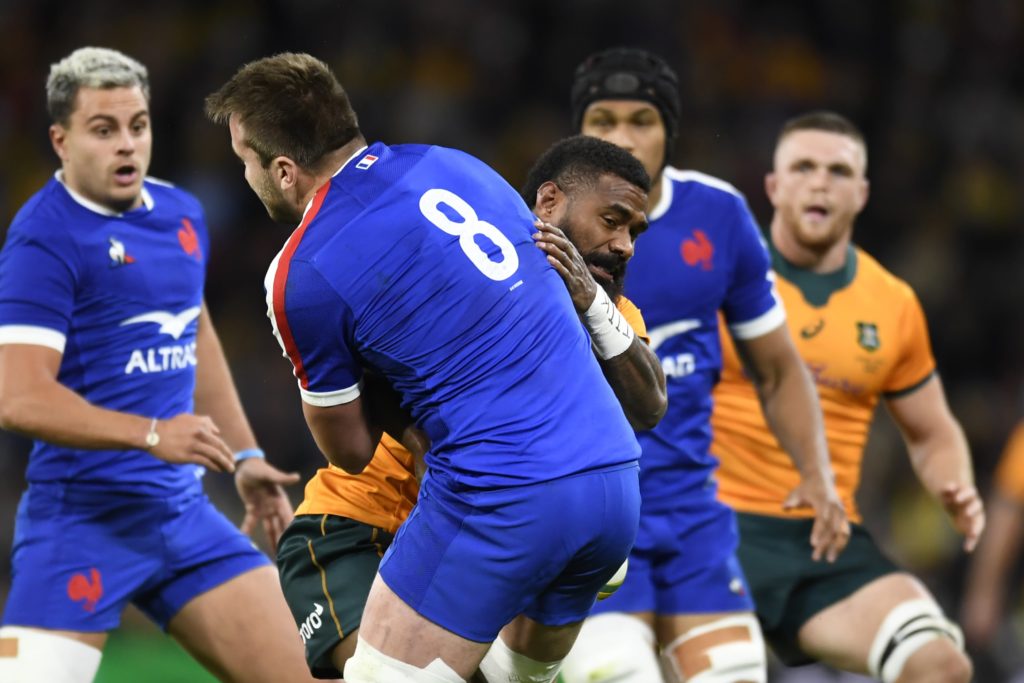
Few gave the Wallabies, who lost only four days earlier, a chance of winning with 14 men on the field for 75 minutes.
Against all the odds, they did.
The question is how?
Some have pointed to the second or third string nature of the French squad; the short-turnaround between Tests; and the fact they were forced to endure quarantine at the end of a marathon Top 14 season.
Yet, that would also ignore the fact France has eight times the number of professional rugby teams than Australia and there are more than 150 Australians playing overseas who will not be picked under the current eligibility laws, including Will Skelton, Rory Arnold, Sean McMahon, Liam Gill and Samu Kerevi.
The Wallabies were undoubtedly galvanised by a sense of grievance following Koroibete’s red. The Suncorp crowd – who have now witnessed nine straight test wins at the venue – were baying for blood.
It would also ignore the fact this Wallabies side is also in its infancy, and the levels of cohesion were nearly as low as the French, who were plucked from both the French Top 14 and Pro D2 to play.
The Wallabies were undoubtedly galvanised by a sense of grievance following Koroibete’s red. The Suncorp crowd – who have now witnessed nine straight test wins at the venue – were baying for blood.
But the Wallabies also benefited from a narrower, simpler game plan by losing their strike weapon out wide.
In the opening two tests, particularly in the second in Melbourne where they dominated possession and territory, the Wallabies were guilty of going wide too early.
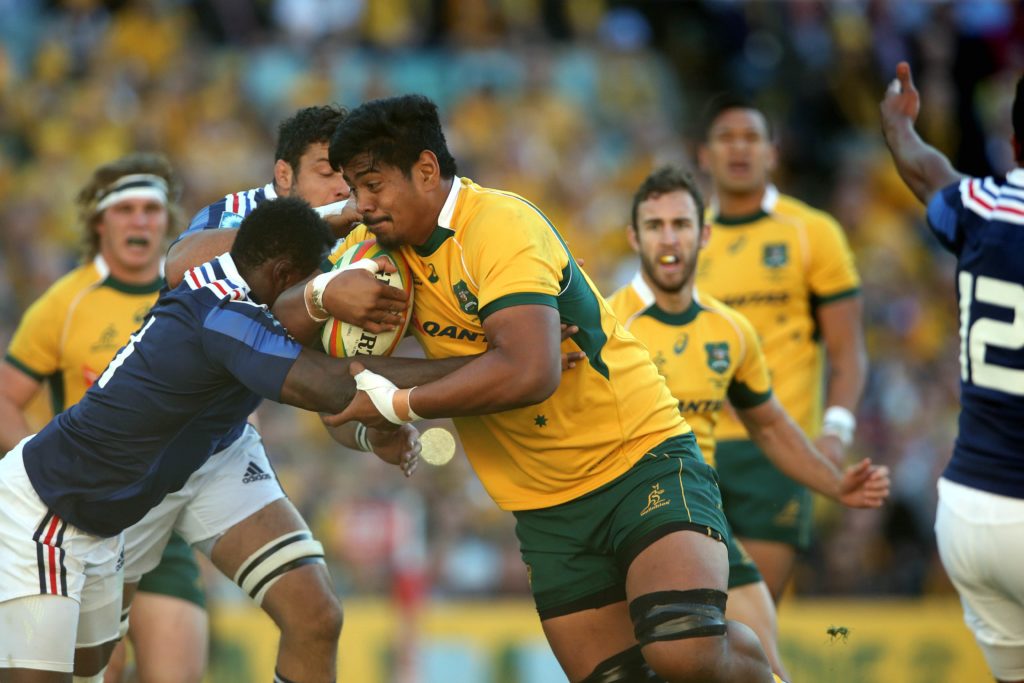
Horan – the Prince of Centres – often talks about earning the right to go wide. Later, Rennie too bemoaned the lack of patience from the Wallabies.
“There were probably only two areas that we lost,” Rennie said following the two-point defeat. “One was breakdown penalties and the other one was the kicking battle.
“While we wanted to play and we did some really good stuff from deep, we’ve got to get the balance right of when to kick on the front foot. There’s times where they kicked and they had a wall in front of us, we need to kick that back and then have a crack at the next one.
“We back ourselves to be better conditioned, but we put ourselves under pressure at times and maybe overplayed at our end.”
In the 29th and 30th minutes, the Wallabies twice went too wide too early in Melbourne. By doing so they exposed their shortcomings at the attacking breakdown, with the French turning the ball over after a Tom Banks carry out wide and later winning a breakdown penalty as Noah Lolesio sought to buy himself extra time by making an extra roll on the ground.
Without Koroibete, as well as right-winger Filipo Daugunu in the third test after being forced from the field in the second minute because of an arm injury, the Wallabies were forced to play a simpler and narrower game-plan.
On the first occasion, the Wallabies went wide from slow ball and found Banks, who was too deep at fullback which allowed the French to slide in defence and then get on the ball.
On the second occasion, Lolesio was at second receiver from another out-the-back play by the Wallabies but ran into traffic immediately from the umbrella rush-defence from the French.
On both occasions, the Wallabies paid the price for going too wide too early.
Without Koroibete, as well as right-winger Filipo Daugunu in the third test after being forced from the field in the second minute because of an arm injury, the Wallabies were forced to play a simpler and narrower game-plan.
It paid off in spades.
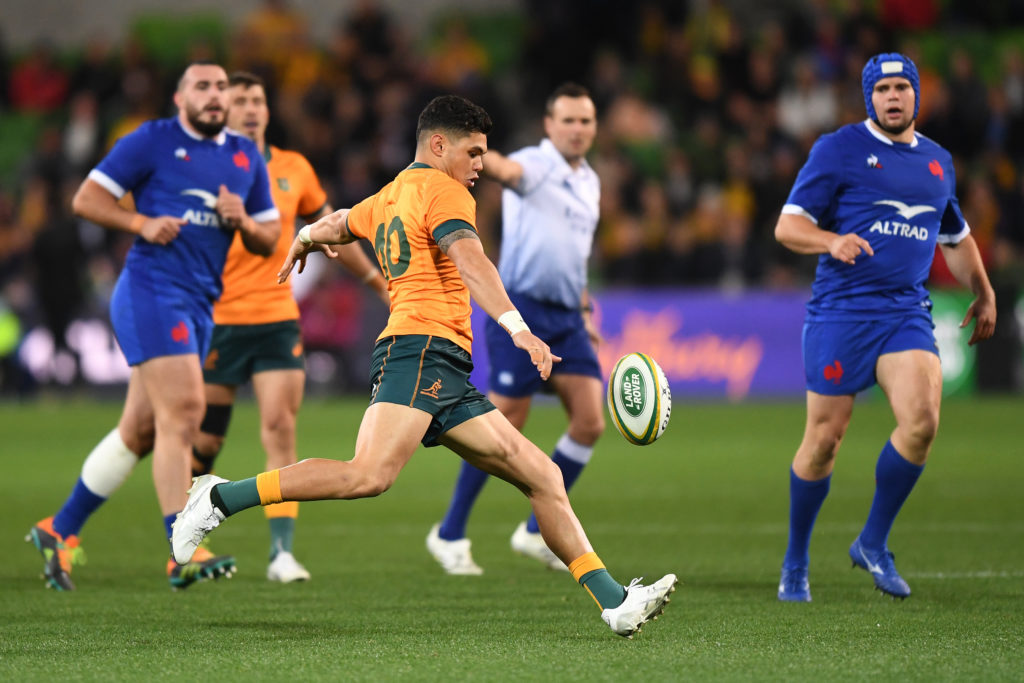
The Wallabies, guilty for years of lacking a fundamental strong skill-set and fitness, seldom turned the ball over, played field position in their own half and went through the middle.
By doing so, it allowed 21-year-old fly-half Noah Lolesio, playing just his fifth start and third in the No 10 jersey, to play flatter.
His sublime cut out pass to captain Michael Hooper culminated in scrumhalf Tate McDermott scoring on his debut start.
Later, the up-the-guts attack – something prevalent elsewhere in the world including in France but not in Australia – began to be deployed by the Wallabies because the numbers simply were not available to play with space and width.
Three times Hooper jumped into scrumhalf late in the first half, leading to a crucial three-pointer to level the score at 20-20 at half-time.
Hooper found fellow back-rower Lachie Swinton who got well over the gain-line in the 40th minute, then saw space made from some crafty work from hooker Brandon Paenga-Amosa, who slightly tackled the French defender beyond the ruck to free up room on the edge of the ruck, and took it by running through a hole and allowing McDermott to use his feet to get well over the gain line. Then Hooper fired another short ball to have his teammate tackled a metre short of the try-line as the arm went out from O’Keeffe.
Simple as it sounds, these are not hallmarks from the Wallabies, once the innovators of rugby.
Yet, the benefit of playing a flatter, narrow game was evident in the excellent work from Isi Naisarani.
The Fijian-born number eight, starting for the first time under Rennie after being looked over in 2020 because of his weight and apparent lack of work rate, had his best game in a Wallabies jersey and certainly his most influential since the World Cup.
Naisarani is the one player in Australian rugby who loves to pick the ball up from the base of the ruck and take advantage of space either side of it.
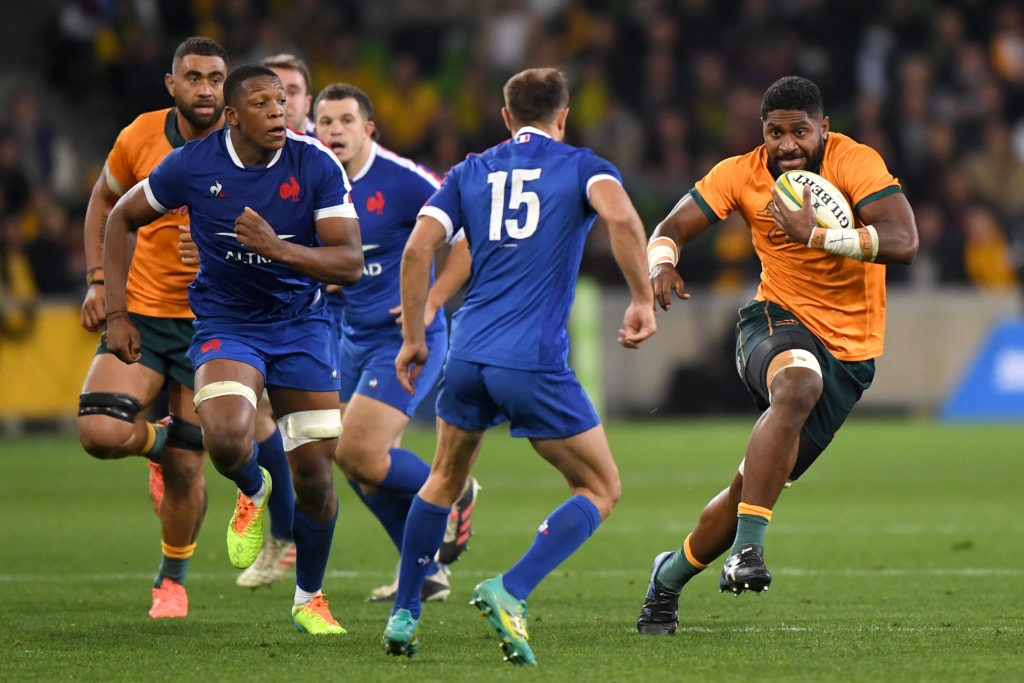
The absence of another winger, as well as the direct approach provided by replacement outside back Reece Hodge, brought Naisarani into the match.
The end result saw the Wallabies stay in the contest, keep their error count low and their infringement rate lower, because they did not try to play too much rugby and therefore leave themselves exposed at the breakdown.
Unlike in New Zealand rugby, where any number of players like TJ Perenara, Jack Goodhue and previously Ma’a Nonu and Richard Kahui, get on the ball, the Wallabies have lacked strong technique and presence to slow the ball down – especially in the backline.
Players have been moved off the ball like people slipping on banana peels.
It was an area identified by Scott Johnson, Rugby Australia’s director of rugby who previously worked in the same role in Scotland and as a coach of Wales, identified long ago.
For Rennie too, a coach who found success at Super Rugby where defences are looser and space is more readily found, it was a learning experience of what the fundamentals of test rugby are about.
Still today, there are few players who are capable of winning a breakdown penalty in the backs other than Hunter Paisami, who is one of the lighter centres in world rugby.
Until Australian rugby rectifies that area, the Wallabies will not be able to get back to the running rugby ways which once had them as the envy of the world as Lloyd McDermott, Mark Ella and later David Campese swore and lived by that mantra.
For Rennie too, a coach who found success at Super Rugby where defences are looser and space is more readily found, it was a learning experience of what the fundamentals of test rugby are about.
With the exception of the 2015 World Cup, finals have been won by a rock-solid defence and a wearing down of the opposition.
In 2019, England thought they saw space and ultimately fell into the trap of trying to exploit it.
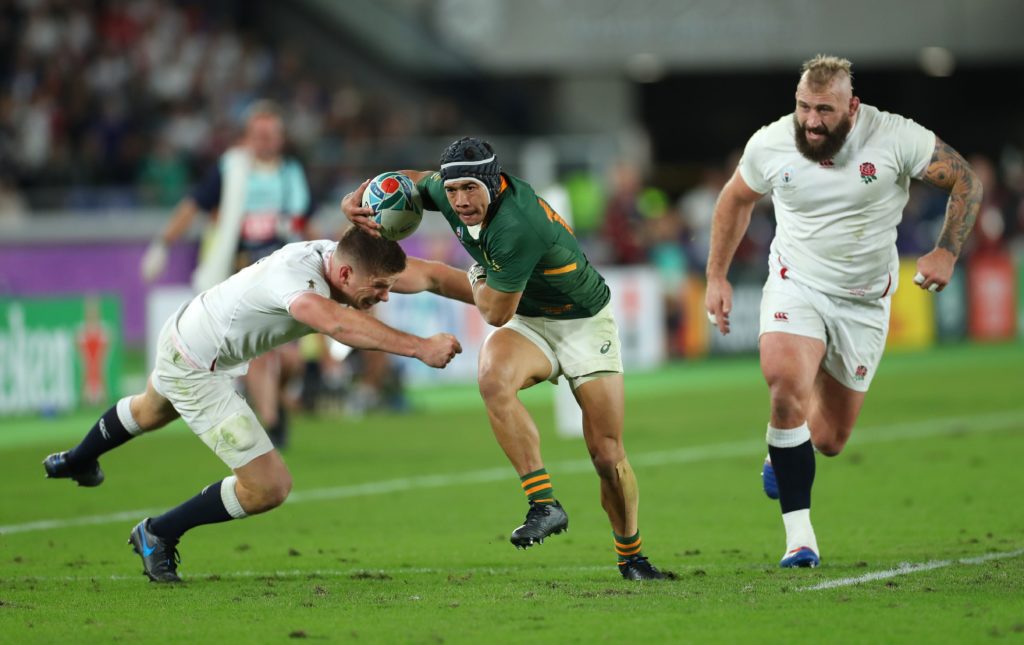
The Springboks pounced on the English errors, who attempted to run the ball out of their own half, and later burnt them at the same game through Makazole Mapimpi and Cheslin Kolbe.
But their late flurry of points only occurred after a strong kick chase and dominance at the set-piece.
On Saturday, with the Wallabies staring down the barrel of a historic low eighth spot on the World Rugby rankings should they have lost the series, Rennie’s side went back to the basics after Koroibete’s red card.
It helped a rebuilding Wallabies side win the game and secured a first three-match test series victory since 2014.
For a nation where rugby has slid down the pecking order with each passing defeat and year since hosting the 2003 World Cup, a series victory, under the immense pressure of losing a player in the fifth minute of the game, cannot and should not be underestimated.
They might not have scored an end to end try, that in fact was saved for France who took a leaf out of the Serge Blanco playbook, but they ground out a victory against the odds.
For a rugby nation deprived of winning, a victory built on character, just like the 2015 World Cup pool win over Wales in a tryless test, was just the tonic needed to sway some hearts and minds.



Comments
Join free and tell us what you really think!
Sign up for free